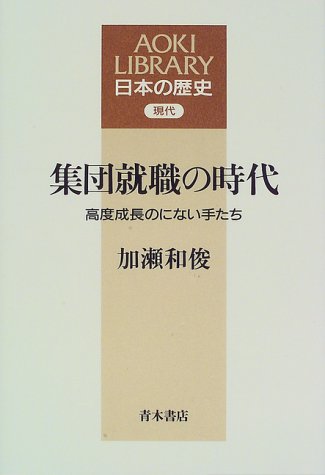3 0 0 0 IR 書評と紹介 岸政彦著『同化と他者化 : 戦後沖縄の本土就職者たち』
- 著者
- 加瀬 和俊 Kase Kazutoshi
- 出版者
- 法政大学大原社会問題研究所
- 雑誌
- 大原社会問題研究所雑誌 (ISSN:09129421)
- 巻号頁・発行日
- no.664, pp.74-76, 2014-02
2 0 0 0 IR 出稼農民像の変容 : 季節労働者失業保険金問題を手がかりに (高度経済成長と生活変化)
- 著者
- 加瀬 和俊
- 出版者
- 国立歴史民俗博物館
- 雑誌
- 国立歴史民俗博物館研究報告 (ISSN:02867400)
- 巻号頁・発行日
- vol.171, pp.25-41, 2011-12
本稿は高度成長期における出稼農民の実態と彼等に対する国民の意識の変化について検討する。高度経済成長期には学歴の向上とあいまって近代的な事務・技術職が増加したが,同時に建設業・下請工業・零細商業等の単純労務職・不安定雇用も増加した。後者の底辺的労働市場の労働者は,すでに農業従事者となっていた者が季節的に労働力需要地に移動して,出稼労働者として働く形態が典型的であった。出稼農民に対する人々の見方は当初は同情的であった。農業所得が少なく生活が困難であるために,一年の半分前後の期間を家族と離れて工事現場に寝泊まりして労働しなければならないという彼等の厳しい状況が,人々の同情を誘ったからである。しかし多くの出稼農民が毎年出稼を終えて帰郷するたびに繰り返し失業保険金を受給しているという事実が広く知られるようになると,こうした同情が薄れ,次第に批判的見方が強まった。彼等が掛金よりもずっと多額の保険金を受け,その結果として失業保険財政が悪化し,一般加入者の掛金が高くなっているという労働省の説明を受けてマスコミがこれを広く報道したためである。農民に対する批判は,米価が政治的理由で不当に高められ食管会計が赤字を抱えていること,農民が税金をごまかしていること等の批判も加わって,強められた。そうした世論の変容と同時に,農村においても就業機会が増加して失業保険金受給の条件が弱まってくるという変化があり,失業保険の受給を既得権と主張していた出稼組合の立場は後退せざるをえなかったし,出稼農民の保険金受給を支援してきた地元市町村,職業安定所の対応も彼等に対して厳しいものに変わっていかざるをえなかったのである。This article reports the actual status of migrant farmers in temporary employment and the changes in people's awareness about them in the high-growth period. In the high-economic-growth period, together with improvement of educational attainment, the amount of modern clerical work and technical work increased. At the same time, however, simple labor or unstable employment in the construction industry, the subcontracted industry, and small-scale businesses also increased. In the latter bottom labor market, as a typical example, workers from rural countries who had already been engaged in agriculture seasonally moved to places with demand for labor and worked as migrant workers. At first, people were sympathetic to migrant farmers working in temporary employment. This was because of their difficult life conditions, whereby they had to stay at construction sites away from their families for about half a year because their agricultural income was low and life was hard, drew people's sympathy. But the fact that many migrant farmers working in temporary employment repeatedly received unemployment insurance payments every year when they returned home after finishing their work was widely known; this sympathy waned and people gradually looked at them with critical eyes. The Ministry of Labor explained that they received much higher insurance payments than the premium, resulting in worsening of the financial condition of the unemployment insurance business and an increase in the premium of general insurers, and the mass media widely reported it. This criticism against farmers was worsened by the further complaint that the price of rice was unjustly increased for political reasons, that the Foodstuff Control Special Account was in the red, and that farmers were avoiding payment of taxes. Concurrently with this transformation of public opinion, job opportunities were increasing in rural villages and their entitlement to unemployment insurance payments was weakening. As a result, the migrant workers union, which had claimed entitlement to unemployment insurance payments as a vested right, had to retreat, and the local governments and the employment exchanges that had supported migrant farmers receiving insurance payments were obliged to take strict action against them.
2 0 0 0 OA 職員層失業対策の歴史的特質 : 小額給料生活者失業救済事業の意義
- 著者
- 加瀬 和俊
- 出版者
- 東京大学
- 雑誌
- 社會科學研究 (ISSN:03873307)
- 巻号頁・発行日
- vol.56, no.2, pp.141-184, 2005-02-07
本稿は中高等教育修了者の就職状況が著しく悪化し,すでに就職していた官公庁・民間企業の職員層の解雇も増加した状況の下で,1929年度から開始された小額給料生活者失業救済事業について,その立案過程・実施過程の特徴を実証的に検討したものである.本稿の分析の結果,失業職員層を対象としたこの事業は,日雇失業者を対象とした失業救済事業とはその内容・性格が大きく異ならざるをえなかったことが明らかになり,失業対策を労働者の階層性,労働市場の分断性を考慮せずに論じることはできないことが確認できた.また,結果的に見れば,失業問題打開のために中高等教育修了者数を減少させよとする財界の主張が実現せず,日中戦争前後の景気回復の中で職員層失業問題がなし崩し的に解消されたのであるから,この事業は客観的には,職員層の失業問題の深刻化を部分的に抑えつつ,景気回復までの時間稼ぎの意味を持ったと位置付けることができる.
- 著者
- 加瀬 和俊
- 出版者
- 政治経済学・経済史学会
- 雑誌
- 歴史と経済 (ISSN:13479660)
- 巻号頁・発行日
- vol.55, no.1, pp.52-53, 2012-10-30
1 0 0 0 OA 海野洋著『食糧も大丈夫也-開戦・終戦の決断と食糧-』
- 著者
- 加瀬 和俊
- 出版者
- 政治経済学・経済史学会
- 雑誌
- 歴史と経済 (ISSN:13479660)
- 巻号頁・発行日
- vol.59, no.4, pp.57-58, 2017-07-30 (Released:2019-07-30)
1 0 0 0 集団就職の時代 : 高度成長のにない手たち
1 0 0 0 OA 戦前日本の失業保険構想
- 著者
- 加瀬 和俊
- 出版者
- 東京大学社会科学研究所
- 雑誌
- 社會科學研究 (ISSN:3873307)
- 巻号頁・発行日
- vol.58, no.1, pp.125-155, 2006-09-30
戦前日本に失業保険制度は存在しなかったが, そのための諸構想は存在し, その一部は法案として議会に提出された.また, 失業保険形態の給付制度は小規模なものではあれ大都市自治体によって実施された.本稿は, それらの諸構想・諸制度を比較し, 諸構想が英独等の制度を参考にしながらも日本資本主義に許容可能な種々の制度的工夫を案出していたことを確認した.実施された日雇共済制度については, 保険形態をとりつつも実質的には公的扶助であり, 赤字削減のための制度的工夫が制度の利用減と休眠化を招いたプロセスを示した.また1920年代には貯蓄奨励制度的な失業給付を容認していた資本家団体が, 1930年代には失業保険形態をとる全制度に反対するにいたった経過を明らかにした.
- 著者
- 加瀬 和俊
- 出版者
- 校倉書房
- 雑誌
- 歴史評論 (ISSN:03868907)
- 巻号頁・発行日
- no.721, pp.71-85, 2010-05
1 0 0 0 OA 共有資源管理の比較制度研究
共有資源の管理システムを、林野・漁業・水利に焦点を当てて比較制度論的に検討した。調査地は、海外 8 カ国、国内 12 カ所で行った。主な知見は以下の通りである。(1)共同体をベースにした共有資源管理制度は、市場経済の浸透のもとでもまだ広汎に残っている。(2)しかしながら、共同体的関係の弛緩とともに、従来は内部で吸収できていたコストが顕在化している。(3)資源管理に関わる技術革新も制度変容の重要な要因となっている。
1 0 0 0 OA 20世紀日本の市場経済と制度設計 - 世界経済・東アジア経済との関連を中心に
- 著者
- 原 朗 山崎 志郎 加瀬 和俊 金子 文夫 岡崎 哲二 寺村 泰 西野 肇 池元 有一 伊藤 正直 植田 浩史 柳 沢遊 沼尻 晃伸 山口 由等 渡辺 純子
- 出版者
- 首都大学東京
- 雑誌
- 基盤研究(A)
- 巻号頁・発行日
- 2008
本共同研究では、制度設計と市場経済の関係性の観点から、20世紀の日本経済を概観し、高度成長期の特徴を捉えた。このため、世界経済およびアジア経済の枠組み、日本の産業構造、産業組織、経済政策、企業間関係、労働市場、消費動向、消費者意識の変化について分析した。その結果、戦後世界の安定化と日本と対アジア関係の再構築、産業政策と産業調整、企業間取引、消費構造の高度化など1950年代から60年代に現れた制度設計と市場経済の安定的で特徴的な様相を明らかにした。


